|
|
|
Sort Order |
|
|
|
Items / Page
|
|
|
|
|
|
|
| Srl | Item |
| 1 |
ID:
113713
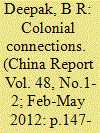

|
|
|
|
|
| Publication |
2012.
|
| Summary/Abstract |
Relying on primary sources in India and China, especially British intelligence reports, this essay attempts to reconstruct colonial era linkages between the two countries from 1905 to 1930. In the first section, the essay examines the connections that Indian nationalists and revolutionaries had with leading Chinese nationalists such as Sun Yat-sen and Zhang Taiyan in Japan and mainland China, and their attempts to devise strategies to dislodge the British from India through armed struggle. This part also discusses the support and sympathy of the Chinese nationalists for the Indian people and the Indian cause. The second section deals with the nature of Ghadar activities in various centers across China such as Hong Kong, Shanghai, Hankou, Nanjing and Beijing and posits that during the initial phase (1913-18), Ghadar activists acted independently and tried to enlist the support of the Chinese nationalists and Germans to procure arms and ammunition for overthrowing the British in India. During the second phase, however, owing to the Bolshevik revolution and the First United Front between the Communists and Nationalists in China, Ghadar activists began vying for the support of both Chinese parties. They were successful in this regard and in turn supported the campaign against the warlords, and even offered their services for the national cause of China. This essay argues that Ghadar nationalists played a pioneering role in uniting the peoples of China to support the fight for Indian independence. Even if much of our information about these national heroes is obtained through British intelligence reports, which are far from comprehensive, let alone objective, it still tells us a great deal about an era in which the revolutionaries of India and China extended helping hands towards each other.
|
|
|
|
|
|
|
|
|
|
|
|
|
|
|
|
| 2 |
ID:
125450
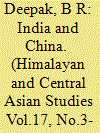

|
|
|
|
|
| Publication |
2013.
|
| Summary/Abstract |
Ever since the formulation of common borders between India and China during the 19th and 20th Centuries, these sailing for Sino-Indian relations has not been smooth. The course of Sino-Indian relationship was filled with the ramps of mistrust, jealousy, hearted and arms conflicts. The territorial aggrandizement of the British and Manchu imperialism turned the peaceful Himalayan region into an area of protracted contest between India and China
|
|
|
|
|
|
|
|
|
|
|
|
|
|
|
|
| 3 |
ID:
144997
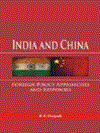

|
|
|
|
|
| Publication |
New Delhi, Vij Books India Pvt Ltd, 2016.
|
| Description |
294p.hbk
|
| Standard Number |
9789385563294
|
|
|
|
|
|
|
|
|
|
|
|
Copies: C:1/I:0,R:0,Q:0
Circulation
| Accession# | Call# | Current Location | Status | Policy | Location |
| 058651 | 327.54051/DEE 058651 | Main | On Shelf | General | |
|
|
|
|
| 4 |
ID:
054760
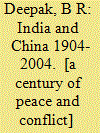

|
|
|
|
|
| Publication |
New Delhi, Manak, 2004.
|
| Description |
xxiv, 508p.
|
| Standard Number |
8178271125
|
|
|
|
|
|
|
|
|
|
|
|
Copies: C:1/I:0,R:0,Q:0
Circulation
| Accession# | Call# | Current Location | Status | Policy | Location |
| 048918 | 327.54051/DEE 048918 | Main | On Shelf | General | |
|
|
|
|
| 5 |
ID:
107675
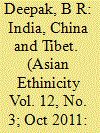

|
|
|
|
|
| Publication |
2011.
|
| Summary/Abstract |
The rationale behind this paper is to stimulate reflection, open a debate and provide its readers with some much overlooked perspectives, perceptions and approaches from China, India and the Tibetan émigrés in India as regards the Tibet issue. These are formulated on the basis of author's interviews and enquiries with the representatives of the Dalai Lama's Tibetan Government in Exile, the leaders of Tibetan Youth Congress, the representatives of Students for a Free Tibet, as well as the Tibetan émigré in India and ordinary Indians. Besides, the paper also throws light on major differences and contradiction between India and China over Tibet issue; the future course of the Tibetan movement; and explores the possibilities of establishing a mechanism between India and China on Tibet.
|
|
|
|
|
|
|
|
|
|
|
|
|
|
|
|
| 6 |
ID:
046552
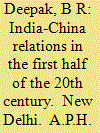

|
|
|
|
|
| Publication |
New Delhi, A.P.H. Publishing Corporation, 2001.
|
| Description |
xii, 200p.
|
| Standard Number |
8176482455
|
|
|
|
|
|
|
|
|
|
|
|
Copies: C:1/I:0,R:0,Q:0
Circulation
| Accession# | Call# | Current Location | Status | Policy | Location |
| 045453 | 327.54051/DEE 045453 | Main | On Shelf | General | |
|
|
|
|
| 7 |
ID:
133738
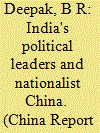

|
|
|
|
|
| Publication |
2014.
|
| Summary/Abstract |
This article discusses how, owing to the commonalities in thoughts and actions of Indian and Chinese nationalists, they forged close ties not only at the individual, but also at the organizational, levels. It posits that while the early Indian nationalists sought to pursue the path of armed struggle to dislodge the British from India, in the second phase leaders of the Indian National Congress (INC) sought to establish links with the Kuomintang (KMT), the ruling party in China. The Indian leadership, especially Nehru, was of the view that there was much in common in the struggle carried out in different colonial countries, including the unification drive in China in the 1920s, and that therefore there was a need to forge close ties to support each other's struggles. It was this thinking of Nehru and others national leaders including Gandhi that culminated in Nehru's China visit in 1939 and Chiang Kai-shek's India visit in 1942, although Chiang's prime objective was to muster India's support for the Allied war effort. The quest for alliance with China did not die out even after the Chinese Revolution; however, developments that unfolded thereafter led in a different direction.
|
|
|
|
|
|
|
|
|
|
|
|
|
|
|
|
| 8 |
ID:
070280
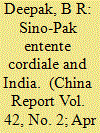

|
|
|
|
|
|
|
|